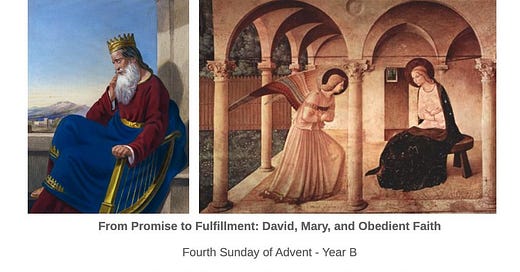2 Samuel 7:1-5, 8b-12; 14a, 16; Rom 16:25-27; Luke 1:26-38
Today's liturgy unveils a profound connection between God's ancient promise and its fulfilment through two pivotal figures: David and Mary. David heard: "I will raise up your heir after you, sprung from your loins, and I will make his kingdom firm" (2 Sam 7:12); Mary heard: "Behold, you will conceive in your womb and bear a son, and you shall name him Jesus. He will be great and will be called Son of the Most High, and the Lord God will give him the throne of David his father, and he will rule over the house of Jacob forever, and of his kingdom there will be no end" (Luke 1:31-33). A millennium that passed between that promise and its fulfilment was called by Saint Paul a time shrouded in mystery.
In the first reading, we meet David troubled by the fact that he lives in a house of cedar, and the ark of God under the tent. The king confides in the prophet his plan to build the temple, and Nathan praises the idea. Unfortunately, both did not consult God who rejected that plan. "Should you build me a house to dwell in?" (2 Sam. 7: 5). The Lord makes two things clear. First of all, David is not worthy to build a house for God, for he shed blood (1 Chron. 28: 3). Secondly, everything that the king has achieved and is still going to achieve is God's grace. "I took you from the pasture, from following the flock, to be the ruler of My people Israel" (2 Sam. 7: 8). The task of building the house of God will fall to an unnamed descendant of David whose identity is unveiled in the Gospel.
David planned to build the temple around 992 BC, while an angel visited Mary of Nazareth around 7 or 6 BC. Both messengers—Nathan proclaiming the promise and the angel announcing its fulfilment—were agents of God. The promise, initially delivered to a shepherd-turned-king finds realization in "a virgin" (Luke 1:27) chosen by divine grace to become the Mother of God's Son, Theotokos. The heart of this promise was the emergence of a descendant destined to build a house for God's name and establish David's throne eternally. Its consummation is found in the birth of Jesus. He builds a spiritual house for God's name—a dwelling made of living stones that offer spiritual sacrifices (1 Pet. 2:5) and the gates of hell will not prevail against it (Matt. 16:18). Moreover, having defeated death, Jesus Christ sits at the right hand of the Father and reigns forever (Rev 11:15).
The mystery of David's descendant hidden for ages is revealed today. What is the purpose of this revelation? To make known the “obedience of faith to all the nations” (Rom. 16:26) which means a life characterised by trust in God. The Septuagint - an ancient Greek version of the Old Testament - expressed it in its translation of the famous fragment from the book Habakkuk: "The righteous shall live by my faithfulness" (Hab. 2:5). In this obedience of faith, the Mother of the Savior is our primary example. By faith, she accepted the words of the angel and said “Yes” to God's will in her life. Mary’s answer "Let it be to me according to your word" changed the course of the history of humankind.
Today's liturgy invites us to witness the extraordinary connection between God's ancient promise to David and its ultimate fulfilment through Mary and Jesus. It illuminates how God's plan, spanning generations and centuries, unfolds in ways far beyond human comprehension. Let us emulate Mary's obedience of faith and trust in God's guiding hand in our lives that alters the course of history through our "yes" to His will.




